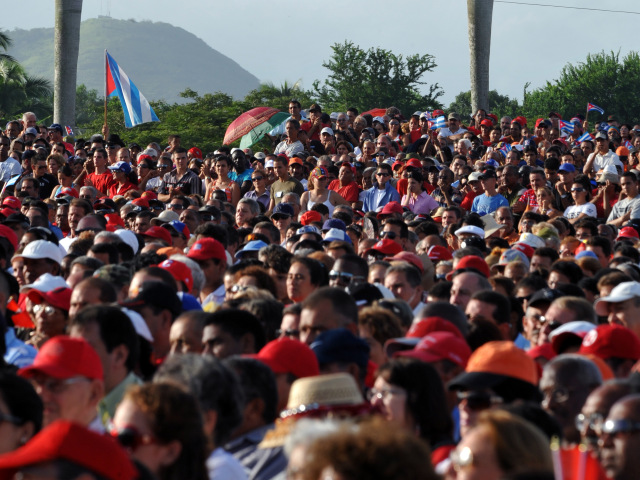Hundreds of pro-democracy Cubans, including current and former political prisoners, signed a letter published on Monday announcing a national strike in which participants will do as little as possible to cooperate with the Castro regime in an attempt to finally end the communist system after 63 years.
The call for a national strike occurred on the eve of one of the most important holidays for the Castro family cult, July 26, the anniversary of a failed coup d’etat attempt against then-President Fulgencio Batista. Castro’s communist forces, having not yet admitted to their Marxist ideology, stormed the Moncada Barracks in Castro’s native eastern Santiago de Cuba. The majority of the terrorists, vastly outnumbered, were massacred. Fidel Castro survived because, according to communist lore, he “got lost” on the way to the barracks and arrived “late.” The communists have nonetheless succeeded in enshrining the idea that Castro “led” the attack in most mainstream retellings of the events of July 26, 1953.
Batista’s government arrested Castro but ultimately pardoned him for the act of political terrorism in 1955, permitting him to later topple the government in 1959 and replace it with a totalitarian communist state.
The national strike against the Castro regime announced on Monday follows months of nearly unceasing protests since July 11, 2021, when estimates suggest nearly 200,000 Cubans took the streets of nearly every municipality on the island to demand an end to communism, attracting a level of international attention that anti-communist protests in Cuba had not previously been able to achieve.
“The extreme situation we are living [in] of repression, of lack of electricity, of shortages of all types, is the compounded result of the policies that a dictatorship that has been in power for 63 years has imposed on the people,” the open letter, obtained by Breitbart News via the Assembly of the Cuban Resistance, read. “Before this reality, and especially since July 11, 2021, the people are openly resisting, losing their fear in giant steps in a national defiance against tyranny.”
“The time has come to no longer cooperate in the least with the regime, to take every opportunity to go to the streets and go anywhere we can to demand our freedom and then proceed, when the conditions arrive, to a great general strike,” the letter concluded. “From this moment, let us be conscious … we are in the first phase of a national strike … do not cooperate with the dictatorship.”
The over 300 signatories include high-profile political prisoners and former prisoners, such as Silverio Portal Contreras, sentenced to four years in prison in 2018 for “disrespect” – a crime in Cuba – who partially lost his vision after enduring regular beatings for being anti-communist in prison. Also on the list is the head of the Association of Free Yorubas of Cuba, Loreto Hernández García, arrested for participating in the July 11 protests and reportedly enduring severe health complications as a result of abuse in prison. The Yoruba faith, sometimes referred to as Lukumí or santería, is an Afro-Cuban religion based on Nigerian Yoruba polytheism. Cuba is officially an atheist state and violently represses all worship outside of the Communist Party.
Other strike participants signed the letter in support of relatives imprisoned after the July 11, 2021, protests. The Communist Party reportedly arrested thousands of people following the protests and processed them through mass trials of as many as 30 people at a time, often including children. Some children received prison sentences of up to 20 years after being found guilty of engaging in anti-communist activity.
The strike organizers also published several promotional videos online urging Cuban citizens to partake in the national strike, refusing to participate in government activities.
The Assembly of the Cuban Resistance, an umbrella organization comprised of many groups against authoritarianism on and off the island, noted in announcing the strike that the national strike “arrives in the context of consecutive days of protests in different parts of Cuba in which a growing number of Cuban citizens have declared themselves against the lack of freedom and extreme shortages that the country is enduring.”
The Assembly estimated that Cuba has experienced over 3,000 protests since July 11, 2021. A year later, the number of protests continues to grow as the Castro regime’s power grid has begun failing on an even more consistent basis nationwide than it has throughout decades of socialist mismanagement, leaving hospitals, markets carrying perishable items, and overheated homes vulnerable.
This weekend, protests erupted in response to “constant blackouts” on both ends of Cuba. According to the Spain-based Diario de Cuba, multiple images published online out of eastern Granma province showed residents of Campechuela banging pots and pans and shouting a slogan that roughly translates to, “turn on the electricity, damn it!” In Matanzas, located in western Cuba, local activists reported crowds banging pots and pans on Friday night, demanding electric power.
In mid-July, a protest in far-eat Pinar del Río attracted a crowd that eyewitnesses estimated to be in the hundreds, similarly demanding the regime step down in response to blackouts, food shortages, and political abuse. The Pinar del Río crowd shouted “down with communism!” and “we are hungry!” in grainy mobile phone footage of the incident.
The widespread disdain for the regime, now openly expressed on the island despite ongoing brutal repression, made for a muted celebration of the deadly failed coup in 1953 on Tuesday. Independent Cuban outlet 24 y Medio reported that the streets of Havana awoke on Tuesday with a heavy police presence and the visible deployment of “black berets,” the reportedly Chinese-trained special forces the communists typically deploy to deter dissident expression.
Figurehead Castro regime “president” Miguel Díaz-Canel presided over a subdued event on Tuesday marking the day, proclaiming in his speech, “if they could, we can” – despite the fact that the attack on the Moncada barracks was a failure.

COMMENTS
Please let us know if you're having issues with commenting.